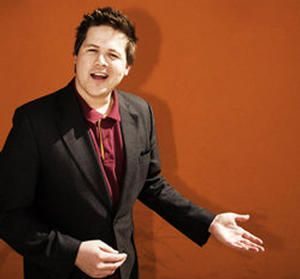Ahead of his show Your New Favourite Poet and the release his first poetry collection, Mondeo Man, Luke Wright chats to Carl Griffin about all things poetic.
Carl Griffin: You’re still touring with Your New Favourite Poet, a poetry stage show. What is a poetry stage show? Is it just one long poem? Do you learn things about the shows you write as the months of touring go by that you never expected to at the beginning of the tour?
Luke Wright: My shows usually have eight to ten poems in them and last about an hour. Sometimes they feel more of a complete whole than at others. For example Your New Favourite Poet is fairly loose, it’s more of a set than a show. However, it does all fit together aesthetically. The poems belong together, they have a similar voice and tone. It’s not unlike a traditional poetry reading, in so much as I contextualise the poems before I read them with an insight to why I’m interested in that subject or a little anecdote from my own life. However, I’ve worked on the intros over time, they’re refine, sharpened, they have plenty of jokes in them. The shows have to be entertaining first and foremost, hopefully they will also have artistic content, they will be enriching as well, but I want my audience to have a good time.
What will your seventh show, Essex Lion, be about? Is the clue in the question?
The opening poem concerns the (non) sighting of the Essex Lion last year. Those campers wanted to see a lion, why else would they be able to convince themselves that a big cat was in fact the king of the jungle! I’ve taken longing as my theme for the show – all the poems are about longing in some way, or take that as their starting point. Some are serious, some are silly; some are personal, others less so. It’s probably a more serious show than Your New Favourite Poet, but it feels lighter and more fun than Cynical Ballads (my fifth show).
You’re an exceptional live performer but how difficult is it to switch to poetry on paper? Is it true you’re dyslexic?
I am dyslexic, but not massively so. I have trouble with spelling and I’m not as good a reader as I should be. I’m pretty good on poetic forms. My work uses traditional poetic metres and regular rhyme schemes, this means the poems can, to an extent, perform themselves off the page. The reader, hopefully, will understand almost instantly how they are supposed to be read aloud. That said, I think poetry should be read aloud, I’m very concerned with how the poems sound.
After a few pamphlets, your first full collection, Mondeo Man, is now out. Is it more of the same, or will people familiar with the poet/performer Luke Wright find something new here?
Yes and no. There’s a progression from my 2009 pamphlet High Performance, the work is better. There’s a mix of poems you might have heard live and ones that I don’t perform. I think there’s plenty of surprises (unless you’ve followed my career VERY closely!).
You have used ballads in your live shows? Do you think ballads can reach a wider (or, at least, different) audience than more contemporary styles of poetry?
I think ballads work brilliantly live. Audiences respond well to narratives and there’s something about ballad metre (di-dum, di-dum, di-dum, di-dum / di-dum, di-dum, di-dum) that appeals to the ear. It’s one of my favoured forms, nearly all my shows have at least one ballad in them. There’s a couple in Essex Lion, one in Your New Favourite Poet. Although I also tell stories in other forms. I have one in rhyme royal in Essex Lion, which is a lovely form, especially for doing nostalgic, slower stuff.
Are there any ballads in Mondeo Man?
There are indeed. One of the tricky bits of the edit was cutting out a few so it wasn’t too ballad heavy.
Which other poetry performers, from the UK , do you enjoy? And, regarding older poets, you have clearly been inspired throughout your career by the legendary John Cooper Clarke, but which other poets or performers have had a big influence on you, positively or negatively?
Positively or negatively, that’s a good way of putting it. On the negative side I really don’t like that preachy American slam style. There are exceptions which prove the rule but I generally find it grating and formulaic. On the positive side I love Tim Turnbull’s music hall poems, they’re great fun and beautifully done in tricky forms. Any of the Nasty Little Press poets (who I edit) are faves too.
Well, they would be…
I also love Catherine Smith’s work. It’s very different to mine but it hits you right in the gut which is how poetry should work.
Luke Wright












